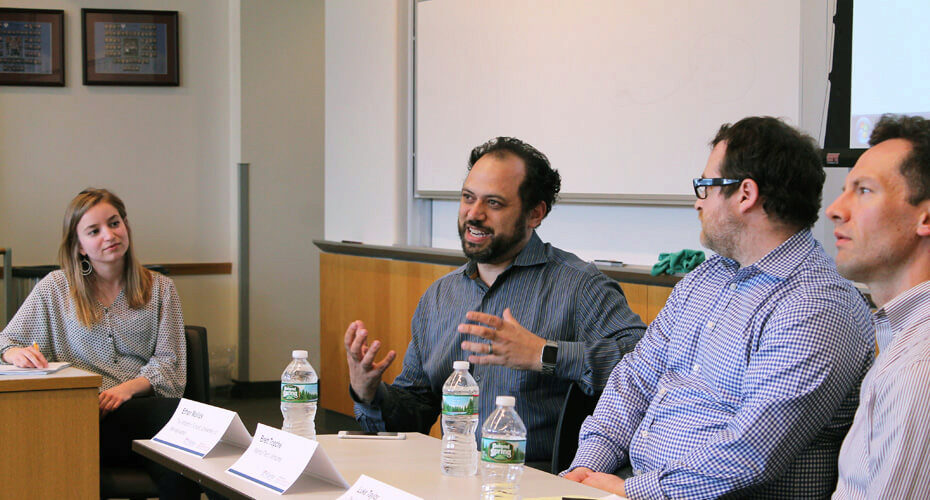A guest post by MIDAs co-founder Andrea Contigiani
The gap between business research and industry practice can loom large at times, but bridging it is essential to ensuring that research is relevant to the outside world. For graduate students at the Wharton School, the Mack Innovation Doctoral Association intends to narrow that gap.
MIDAs organized its first industry-academia panel earlier this spring. The panel series is an experiment to bring together practitioners, professors, PhD students, and MBA students to discuss a highly relevant topic in the area of innovation. Our goal is to create an opportunity to bring research closer to practice and to inform practice with research.

This opening round hosted a great discussion about the current challenges in the financing of innovation.
We had an exceptional set of speakers: Professor Ethan Mollick (Management Department, the Wharton School), Professor Luke Taylor (Finance Department, the Wharton School), and Brett Topche (Managing Director, MentorTech Ventures). While all had expertise in the topic, the guests each had very different backgrounds, which made the discussion extraordinarily stimulating.
We talked about a variety of topics in venture capital, crowdfunding, and entrepreneurial management. The first debate centered around how VCs choose which ventures to invest in. Topche told us about an interesting experience — the investment in one of the now-hottest Philadelphia-based tech startups — highlighting how the key element was really the team. In fact, Topche’s firm decided to keep supporting the venture despite its initial failure because the strength of the team convinced them the company would be able to successfully pivot. That’s exactly what happened.
We then moved on to speak about how current technological changes are affecting VC investment strategy. Many recent technologies — from the cloud to 3D printing — have substantially cut the cost of starting businesses. Taylor suggested this has induced VCs to take a “spray-and-pray” strategy, where they place many small bets on a lot of companies, wait to get a better sense of the true quality of the product, and then continue to support only a small number of them.
Mollick discussed the gender gap problem in the VC world. He reported empirical evidence from his research and anecdotal evidence about how there still seems to be a form of gender bias in VC investment decisions. He gave us his view on the drivers of the problem and some of its potential solutions, such as crowdfunding.
We also discussed another recent trend in the VC world: the use of big data in driving investment strategy. One of MIDAs students asked why VCs would not be more willing to use data to make decisions. The speakers suggested that, despite some interesting cases, such as Correlation Ventures, data management capabilities are still uncommon in this industry, so that strategy is still very costly for most VC firms. But certainly a trend to keep an eye on!
Finally, of course, we talked about how researchers could interact more with VCs. Although there is still significant distance between academia and practice in this domain, it’s clear that both parties would gain from working together a bit more.
Interested in participating in MIDAs? Learn more and contact the organizers here.
About the Author
 Andrea Contigiani is a PhD student in Management at The Wharton School, where he is specializing in Entrepreneurship and Strategy. He received a BS in Business Administration from LUISS, a MS in Economics and Social Science from Universita’ Bocconi, and a MA in Economics from the University of Pennsylvania. Before starting the PhD program, he was a researcher at Wharton Entrepreneurship. His research explores a variety of elements of the innovation process: from individual motivation to organizational structure, from strategic decision-making to intellectual property regulation. He uses primarily experimental methods, both in the lab and in the field. His dissertation investigates drivers and effects of strategic experimentation, a key strategic choice for both new ventures and mature firms.
Andrea Contigiani is a PhD student in Management at The Wharton School, where he is specializing in Entrepreneurship and Strategy. He received a BS in Business Administration from LUISS, a MS in Economics and Social Science from Universita’ Bocconi, and a MA in Economics from the University of Pennsylvania. Before starting the PhD program, he was a researcher at Wharton Entrepreneurship. His research explores a variety of elements of the innovation process: from individual motivation to organizational structure, from strategic decision-making to intellectual property regulation. He uses primarily experimental methods, both in the lab and in the field. His dissertation investigates drivers and effects of strategic experimentation, a key strategic choice for both new ventures and mature firms.



